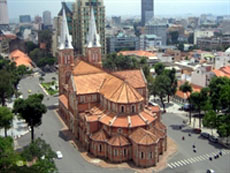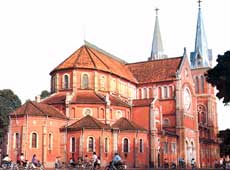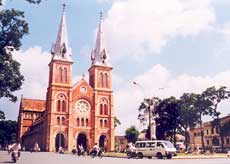Ho Chi Minh City’s Notre Dame Cathedral is undoubtedly an architectural masterpiece of immense cultural and historical value.
 In the early years of its colonial administration, the French government decided to build a church when planning the construction of Saigon, the capital of French Indochina.
In the early years of its colonial administration, the French government decided to build a church when planning the construction of Saigon, the capital of French Indochina.
Bishop Leferve was in charge of constructing the church, but the first effort was too small so a larger one known as the Sai Gon church was built on the banks of the Charner canal. However, as it was mostly made of wood, termites ravaged the structure and so the bishop went back to the drawing board.
In 1876, he organised a design competition. The French architect J. Bourad submitted the winning design and construction work subsequently began in 1877. Bourad was actively involved in the bidding process and also directly supervised the work. Incredible, considering every single piece of material used came from France. The work was completed by 1880.
The tiles covering the façade came from the French of Marseille. These tiles have no mortar coating and are immune to moss so they can maintain their rosy-red colour. Hence, the church’s overall radiance and resplendence against the background of the shady green perennials.
The bells, the bells!
 The cathedral, 93m long, 35.5m wide and 57m high from the ground to the bell tower, is an imposing building but not as too large as it appears at first sight.
The cathedral, 93m long, 35.5m wide and 57m high from the ground to the bell tower, is an imposing building but not as too large as it appears at first sight.
The design incorporates the classical beauty of Romanesque gothic architecture. It also retains its original interior and is home to some uniquely rare antiques.
The six bells weigh 28,850kg in total and ring out a peal of six musical notes - do, re, mi, sol, la, si - every time they go.
The decorative designs on each bell are very delicate, and the ‘so’ bell is among the biggest in the world weighing 8,785kg with a diameter of 2.25m and 3.5m tall. This bell tolls once a year, on Christmas Eve, the only night when all six bells are rung together.
To ring the bell, it takes three or four robust men to turn the starter on so that the bell can swing as high as possible. On Sundays and during festivals, three bells chime together, but on week days, only one bell tolls, at 5am and 5.30pm. Despite the din of Ho Chi Minh City’s suburbs, you can hear the bells from 10km away.
The giant clock under the vault between the two bell-towers is another rare antique. It was made in Switzerland in 1887 weighing more than 1,000kg. Although the clock still works, it has been left unused for many years.
As time has taken its toll, the huge ancient organ inside the cathedral is not in used anymore as worms have eaten into its woodwork.
Thankfully, a lot of the interior’s ornaments and decorative designs have been kept intact and well preserved. The high altar is made of monolithic marble, featuring engravings of six angels supporting the canons table and the pedestal of three compartments, each being a carving describing a religious event.
Each chapel, stained glass window and vault is a work of art. Everything is engulfed in a gentle light that gives you a sense of complete peace, devotion and holiness. This, despite the fact, that the cathedral is fitted out with electric lights and has no space for candles.
A centre piece of the city
 The cathedral is spacious and can accommodate a congregation of 1,200. In front of the cathedral, the paths run across the park in the shape of a huge cross. In the centre of the park stands a marble statue of the Blessed Virgin Mary. Her arms embrace the globe with a cross while her feet stamp on a snake, expressing a wish to bring peace to all humanity.
The cathedral is spacious and can accommodate a congregation of 1,200. In front of the cathedral, the paths run across the park in the shape of a huge cross. In the centre of the park stands a marble statue of the Blessed Virgin Mary. Her arms embrace the globe with a cross while her feet stamp on a snake, expressing a wish to bring peace to all humanity.
The statue, also called the Virgin of Peace, became an international sensation when it was reported to have shed tears in October, 2005.
Thousands of people flocked to the cathedral to behold this supposed miracle, forcing the authorities to stop the traffic around the area. Vietnam’s top Catholic clergy quickly confirmed that the statue had not shed tears but this failed to disperse the crowd for some days. The reported ‘tear’ which flowed down the right cheek of her face was the result of pollution.
For over 129 years, Notre Dame has been a place for Catholics to gather, but it has also become an icon of Ho Chi Minh City.
Although located in the middle of a bustling metropolis, the unique architecture of Notre Dame always brings visitors a quiet and peaceful ambience. At present, the cathedral has a team of volunteer guides who can speak several foreign languages fluently to present the most attractive aspects of its history.